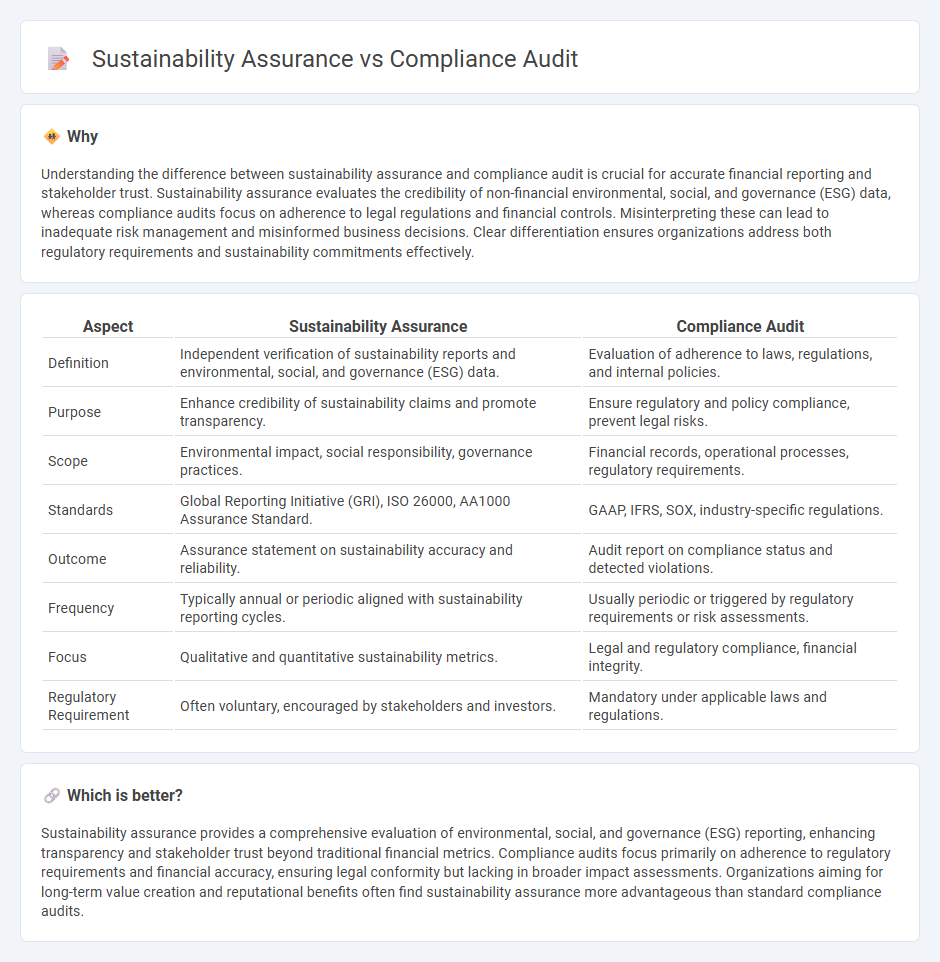
Sustainability assurance evaluates the accuracy and reliability of environmental, social, and governance (ESG) disclosures, emphasizing corporate responsibility and long-term impact. Compliance audits focus on verifying adherence to regulatory requirements and internal policies, ensuring that organizations meet specific legal and financial standards. Explore deeper insights into how each approach strengthens corporate transparency and accountability.
Why it is important
Understanding the difference between sustainability assurance and compliance audit is crucial for accurate financial reporting and stakeholder trust. Sustainability assurance evaluates the credibility of non-financial environmental, social, and governance (ESG) data, whereas compliance audits focus on adherence to legal regulations and financial controls. Misinterpreting these can lead to inadequate risk management and misinformed business decisions. Clear differentiation ensures organizations address both regulatory requirements and sustainability commitments effectively.
Comparison Table
| Aspect | Sustainability Assurance | Compliance Audit |
|---|---|---|
| Definition | Independent verification of sustainability reports and environmental, social, and governance (ESG) data. | Evaluation of adherence to laws, regulations, and internal policies. |
| Purpose | Enhance credibility of sustainability claims and promote transparency. | Ensure regulatory and policy compliance, prevent legal risks. |
| Scope | Environmental impact, social responsibility, governance practices. | Financial records, operational processes, regulatory requirements. |
| Standards | Global Reporting Initiative (GRI), ISO 26000, AA1000 Assurance Standard. | GAAP, IFRS, SOX, industry-specific regulations. |
| Outcome | Assurance statement on sustainability accuracy and reliability. | Audit report on compliance status and detected violations. |
| Frequency | Typically annual or periodic aligned with sustainability reporting cycles. | Usually periodic or triggered by regulatory requirements or risk assessments. |
| Focus | Qualitative and quantitative sustainability metrics. | Legal and regulatory compliance, financial integrity. |
| Regulatory Requirement | Often voluntary, encouraged by stakeholders and investors. | Mandatory under applicable laws and regulations. |
Which is better?
Sustainability assurance provides a comprehensive evaluation of environmental, social, and governance (ESG) reporting, enhancing transparency and stakeholder trust beyond traditional financial metrics. Compliance audits focus primarily on adherence to regulatory requirements and financial accuracy, ensuring legal conformity but lacking in broader impact assessments. Organizations aiming for long-term value creation and reputational benefits often find sustainability assurance more advantageous than standard compliance audits.
Connection
Sustainability assurance and compliance audit intersect through their focus on verifying organizational adherence to environmental, social, and governance (ESG) standards and regulatory requirements. Both processes involve systematic evaluation of internal controls, data accuracy, and reporting frameworks to ensure transparency and accountability in sustainability disclosures. Integrating these audits enhances stakeholder trust by confirming that sustainability initiatives comply with legal obligations and industry best practices.
Key Terms
**Compliance Audit:**
Compliance audit evaluates an organization's adherence to regulatory requirements, standards, and internal policies, ensuring legal and operational conformity across financial, environmental, and safety domains. It identifies risks, discrepancies, and non-compliance issues through systematic examination of records, processes, and controls, promoting accountability and risk mitigation. Explore further to understand the critical role of compliance audits in maintaining regulatory integrity and operational excellence.
Regulatory Requirements
Compliance audits systematically evaluate an organization's adherence to regulatory requirements, ensuring that laws, industry standards, and internal policies are consistently met. Sustainability assurance extends beyond compliance by verifying the accuracy and reliability of sustainability disclosures related to environmental, social, and governance (ESG) criteria, often aligning with frameworks like GRI, SASB, or TCFD. Explore how integrating both approaches enhances corporate accountability and drives sustainable business practices.
Internal Controls
Compliance audits primarily evaluate the effectiveness of internal controls in meeting regulatory requirements, ensuring organizations adhere to legal standards and avoid penalties. Sustainability assurance focuses on internal controls related to environmental, social, and governance (ESG) reporting, validating the accuracy and reliability of sustainability disclosures. Explore further to understand how both approaches enhance organizational transparency and risk management.
Source and External Links
What is Compliance Audit: A Comprehensive Guide | MetricStream - This webpage provides a comprehensive guide to what a compliance audit is and its importance in ensuring adherence to regulatory guidelines and internal policies.
What is compliance audit? | Definition from TechTarget - This definition explains that a compliance audit is a comprehensive review of an organization's adherence to regulatory guidelines, highlighting examples like SOX and HIPAA compliance.
Compliance Audit: Definition, Types, and What to Expect - AuditBoard - This article discusses what a compliance audit entails, including its characteristics and the expectations for organizations undergoing such audits, with a focus on independent assessment and regulatory frameworks.
 dowidth.com
dowidth.com